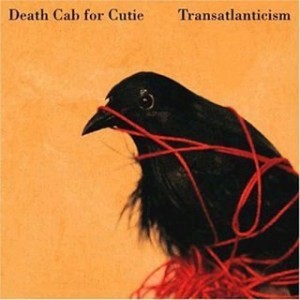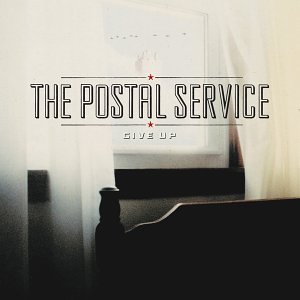FOREWORD: Perhaps the title of Death Cab For Cutie’s ’03 album, Transatlanticism, was precociously prophetic. Its success led to a major label signing and better corporate support for ‘05s engaging Plans. And three years hence, the band, led by Ben Gibbard, gained complete universal acceptance with ardent single, “I Will Possess Your Heart,” from adventurous departure, Narrow Steps.
I found Gibbard to be casual and friendly. In 2000, I talked to him briefly before a Knitting Factory gig and a few years later spent a few seconds with him at Irving Plaza during the Plans tour. This article originally appeared in Aquarian Weekly.
Washington-based singer-songwriter-multi-instrumentalist Ben Gibbard has been a busy boy lately. Besides recording, then touring, for Death Cab For Cutie’s intriguing ’03 long-player, Transatlanticism, he constructed Postal Service’s intoxicating sidestep, Give Up, with Dntel mastermind Jimmy Tamborello.
Named after a ‘60s track by comedy-musical troupe, Bonzo Dog Band, Seattle-based Death Cab For Cutie gained acceptance amongst cynical post-adolescent intellectuals and hip literary-bound collegiate twerps with informal ’97 indie cassette You Can Play These Songs With Chords, re-recording eight songs for resilient Barsuk debut, Something About Airplanes.
Along with guitarist-pianist-producer Christopher Walla and a loose cast, the Gibbard-led outfit returned in 2000 with the tidy We Have The Facts And We’re Voting Yes, which juxtaposed Death Cab’s silky textural gauze and scintillating melodicism with the exuberant knockout jab, “Campany Calls.” ‘01s more majestic The Photo Album boasted stunning bedroom pop triumphs like the chilling “Styrofoam Plates” and the delicately absorbing 6-string illumination “A Movie Script Ending.”
Continually refining their beautifully transporting dramatic sophistication via exquisite dirgey laments, ‘03s Transatlanticism may be Death Cab’s most ambitious declaration. Gibbard’s lyrically sensitive understated eloquence exposes naked melancholic introspection as he struggles for true love only to be mired by longing, loneliness, and loss.
only to be mired by longing, loneliness, and loss.
Feelings of detachment and discontentment envelop the sentimental title track, the balladic “Lightness,” and the tranquil piano pledge “Passenger Seat.” The anthemic claustrophobic nightmare “We Looked Like Gaints” and the upbeat turnabout “The Sound Of Settling” pick up the pace but retain the dire moodiness, ambling through the dismal diagnosis of ‘hunger twisting my stomach into knots’ and dismayed by ‘the black night with all its foul temptations.’
As for the Postal Service, an enchanting minimalist complexity stimulates the percolating percussive syncopation and oscillating phase-shifting modulations of Give Up. Rilo Kiley’s Jenny Lewis provides sympathetic descant vocals to buoy Gibbard’s hushed moans on the new wave-ish electro-deconstruction “The District Sleeps Alone Tonight” and the bleating symphonic meditation “Recycled Air.” Seasoned Seattle folkie Jen Wood’s honeyed soprano counters Gibbard’s apologetic manifesto on the disco-fied robotic orchestral “Nothing Better.”
AW: What inspired you to get into music initially?
BEN GIBBARD: There were always records on when I was a kid. My dad was always fooling around on acoustic guitar. He’d listen to the Beatles, Badfinger, AC/DC, Devo. In college, I got turned on to Beat literature. There’s a poetic nature to my songs. I want them to be about something and have meaning. I don’t want them to be throwaways.
Your contemplative confessional serenades blanket Transatlanticism.
Yeah. Transatlanticism came out of a hopeless period – that sense of desperation, the toils of life weighing down on me more than usual. Life’s better these days.
Is it difficult to express frustration without becoming vindictive?
No. “Tiny Vessel” is close to vindictive, but I’ve never found anything I wrote to be too harsh. That song’s about a relationship that ended in Silverlake. It’s a long story so obviously about somebody I wouldn’t want to admit who it is. In my personal life, there’ve been times I couldn’t believe how disgusted I was letting lust overtake my brain. A sense of loneliness and yearning for someone you have no business being with takes over the practical thinking part of the brain and turns it off for a chunk of time.
Your Postal Service tape exchange project, Give Up, with Dntel’s Jimmy Tamborello, seemed reminiscent of electronic weirdos Matmos, with its crunchy brittle beats and understated whim.
 The context worked. It appealed to a way my brain works. People ask, ‘How do you make a record sound that way when two people are living apart?’ Essentially, it’s a musical version of editing. Jimmy would send me a story and I’d edit it down to what I thought was the best story possible and then put my tracks on top. Jimmy does the hard work – the music. I just cut it down, wrote out the feelings I got from it, put finishing touches, sent it back.
The context worked. It appealed to a way my brain works. People ask, ‘How do you make a record sound that way when two people are living apart?’ Essentially, it’s a musical version of editing. Jimmy would send me a story and I’d edit it down to what I thought was the best story possible and then put my tracks on top. Jimmy does the hard work – the music. I just cut it down, wrote out the feelings I got from it, put finishing touches, sent it back.
Is it difficult to sing autobiographical material like Postal Service’s ominous “The District Sleeps Alone Tonight,” “Brand New Colony,” or “This Place Is A Prison”?
I think it’s easier. As I start to work on new material, I’m making a conscious effort to do everything differently. I want to approach writing from another angle. It’s been easier for me to express something, fill in details, and make it come alive because it’s true to my life. At the same time, I’m in a position where I’m more concerned with trying to write pure fiction as if I were a novelist. That’s my new challenge. To make a story come alive when you haven’t experienced it is amazing.
“Sleeping In” accepts that challenge. You’re ‘sleeping in’ when Kennedy was shot!
Totally. Like when Transatlanticism came together, it was like making a surreal world for myself. It jumped off the page and became songs. David Berman (of the Silver Jews) and Lawrence Ferrenghetti are poets I like. Usually poety makes me cringe. It’s attempted by too many and executed by too few. To speak in simple language and create incredible images counters obnoxious poetry like ‘the transcendental spiders crawling the walls of existence’ or whatever pretentious bullshit. Berman could write an awesome poem about a snowman melting and make it into a clver anecdote without resorting to empty language.
Earlier, you worked with Dntel on Life Is Full Of Possibilities. Obvious question: Is “Evan and Chan” about drug-addled indie pop legend Evan Dando (ex-Lemonheads) and overly sensitive singer-instrumentalist Chan Marshall alias Cat Power)?
It’s about a dream I had about Evan and Chan. I’d just gotten a car at my grandma’s house and I was driving cross-country back to Seattle and stayed at a hotel and had this crazy dream of being at a random Evan Dando reunion show and Chan being there. She either couldn’t speak or was speaking in tongues. Nothing made sense but I felt compelled to write about it. I saw Evan awhile back at a Chop Suey show attended by only about 40 people. It was sad. He hopped up onstage, burned through 12 songs without saying hello. Everyone there was incredibly excited he was there. Someone was filming the show, so he stopped mid-song to let the guy give him the tape. He bailed early. But I’ve always liked his songs.
You’ve always enjoyed good pop. You’ve re-done Cyndi Lauper’s “Girls Just Want To Have Fun” and Eurythmics “Here Comes The Rain Again” on miscellaneous EP”s or compilations.
I’m a pop lover. I’ve done Avril Lavigne’s “Complicated” live. I’m very much over the rock stigma of only liking things from a small pool of music. It’s incredible to see the response for that fucking amazing Outkast song, “Hey Ya.” Beyonce’s “Crazy In Love” is also a great single.
On The Photo Album, your music became more sublime and provocative without losing the immediacy of previous recrodings. And the drum track is way high in the mix.
I played drums on We Have The Facts. While I’m not a great drummer, Chris pushed the drums up to cover the fuck-ups (for The Photo Album). We toured those songs into the ground. By the time we went into the studio, we recorded them exactly the same way we did them live. But now it conjures up more negative than positive feelings. It was a dark period where we couldn’t communicate properly with our drummer. We were bored with the material and the record suffers. I love the record but as I get more distance from it, I realize there were very few flurries of creativity. On the other hand, You Can Play These Songs With Chords was meant for fans. It takes me back to a time when we were working on music in houses – a more innocent time. Our guard was down. It was liberating.
But Transatlanticism was the most fulfilling experience. It opened up new channels and I now feel excited about our next album. The number one big difference is we don’t bring out new material on tour until it’s recorded. We deliberate more and arrange them in a practice space better. Also, having drummer Jason Mc Gerr, an old friend, in the band, helped. Once we got in a room with him, there was no audition. We just started working immediately. In any band dynamic, there tends to be a theme. We were able to work with a higher level of trust. We didn’t care who did or didn’t play on a song, as long as it sounded fine. We sidestepped the dilemma of having everyone worry if they had parts in each song.
“The New Year” yearns for simpler times when the world’s flat and airplanes and freeways don’t exist. It may be Transatlanticism’s most direct statement.
That whole album came together and has the appearance of a concise statement. The songs had a theme that at this point of my life came together nicely. We thought this record might isolate fans, but it turned out real well.
The thrice-mothered “Death Of An Interior Decorator” seemingly concerns a materialistic lady who moves beyond self-obsession.
That’s a song based on Woody Allen’s Interiors. But I like your take. The movie’s about a disruptive relationship. For me, it’s a juxtaposition of being young, innocent, finding love, then getting old and jaded. Vices become bad habits. People who partied too much may have become alcoholics. It’s sorta like a John Mellencamp song, but not really. I love Mellencamp.
You’ve contributed three stripped down songs to a split single with American Analog Set’s Andrew Kenny. Tell me about that.
Ben Dickey is an indie rock rennaisance man tour-managing Spoon and Nada Surf while putting out ‘Home Series’ EP’s. One of the first was from Kind Of Like Spitting, then Britt Daniel (Spoon) and Conor Oberst (Bright Eyes) did one. They have letter-pressed covers. The theme of my EP is home. I peppered it with lo-fi acoustic stuff. It’s for people who are already fans.
-John Fortunato